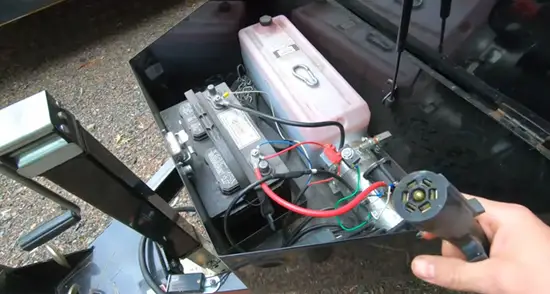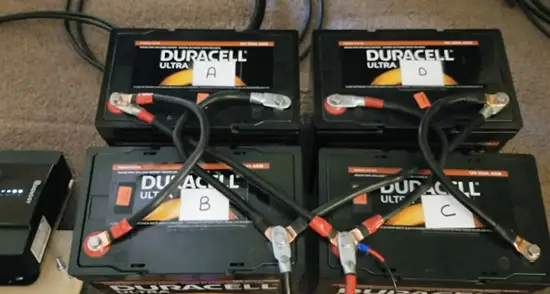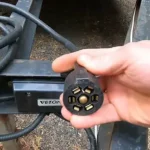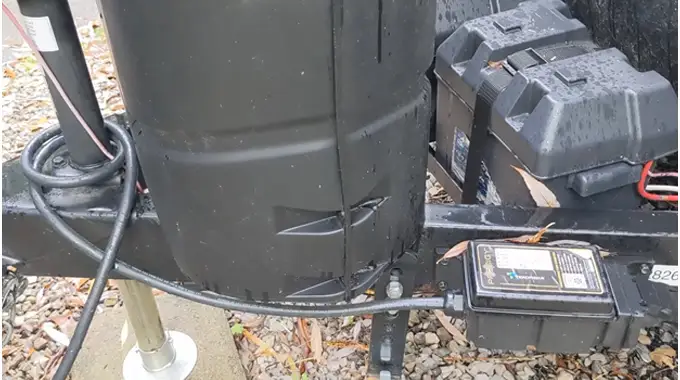Last Updated on May 1, 2023
Does your RV battery need a charge? You may be able to charge it by hooking it up to your tow vehicle. While most vehicles will not charge an RV battery, some may have the capability to do so.
If your vehicle has a battery charger, you may be able to use it to charge your RV battery. You should precautions to make sure that this is safe and will not damage either the battery or the vehicle.
Throughout this article, we will try to simplify the answer to a complicated question and give you all the information that you need to know about charging your RV’s batteries while driving.
Does Tow Vehicle Charge RV Battery : A Brief Overview
The answer is yes, but there are a few things to keep in mind. First of all, due to the length of the wire from the tow vehicle to the RV, there is a significant amount of line loss. As a result, the minimum voltage that the converter will output is not enough to fully charge the RV battery, but it will help to keep it topped off.
Some newer vehicles have settings in their onboard computers that increase the alternator output when the 7-pin connection is made or when the lights are turned on. This can help to charge the RV battery more quickly. Therefore, while your tow vehicle can charge your RV battery, it is important to keep an eye on the voltage level and top off the battery as needed.
The Process of Charging Via Tow Vehicle:

Most tow vehicles have a 12-volt power outlet that can be used to power the RV battery. However, this will only provide a small amount of current and will not fully charge the battery. If you want to charge the battery, you will need to use a battery charger.
Some experts recommend using a 12-Volt Universal Battery Charger. This charger features pulse maintenance and will not overcharge the battery like many of the common chargers do.
To use the charger, first, disconnect the negative (-) terminal on the trailer battery. Then, connect the red (positive) charger to the positive (+) terminal on the battery. Finally, connect the black (negative) lead from the charger to a clean, unpainted metal surface on the RV frame.
It is critical that the surface is clean so that there is no risk of sparks or fire. Once all of the connections are secure, turn on the charger and allow it to charge the battery until it is full.
Why Tow Vehicles are Not Ideal for Charging RV Battery?
There are many reasons why tow vehicles are not ideal for charging RV batteries. We will discuss them below.
- The alternator is Not Powerful Enough: Alternators are designed to recharge the battery while the engine is running. However, they are not usually powerful enough to charge a large RV battery. RVs require a lot of electricity to run, and their batteries are much larger than the average car battery.
- The engine is Not Used While Parking: During a break or when going to the mall, you turn off the engine of the tow vehicle to save fuel. The engine of a tow vehicle is typically not running when the RV is parked, so there is no way to charge the battery using the engine.
- Tow Vehicles Do Not Have a Built-in Charger: As an RV battery requires sufficient voltage to be charged, they need specific chargers to do the job. Most tow vehicles do not come with a built-in charger, so you would need to purchase one separately in order to charge your RV battery.
- Wiring is Not Set Up to Charge an RV Battery: In order to keep an RV battery charged, it is necessary to install a special charging system. Unfortunately, the wiring in most tow vehicles is not set up to charge an RV battery.
What are the Alternate Ways of Charging RV Batteries?

- Solar Power: RV batteries can be charged in a number of ways, but using a solar panel is one of the most efficient methods. Solar chargers work by converting sunlight into electrical energy, which can then be used to charge the RV battery.
To use a solar panel, simply place it in an area where it will be exposed to direct sunlight and connect it to the battery. The solar charger will then begin to trickle charge the battery, slowly increasing its power over time.
This method is especially beneficial if the RV will be stored for long periods of time, as it will help to keep the battery from losing its charge.
- Generator: One way to charge an RV battery is by using a generator. Generator power is typically much higher than that of a standard household outlet, making it ideal for charging RV batteries.
Many generators come with built-in charging ports that make it easy to connect your RV battery. However, it’s important to make sure that your generator is properly sized, as using an undersized generator can damage your battery and shorten its lifespan.
- DC-DC Charger: A DC-DC charger is designed to convert DC power from one source (like your vehicle’s alternator) into DC power that can be used to charge another DC device (like your RV battery).
This type of charger is typically more efficient than an AC-to-DC charger, and it can also help to prolong the life of your RV battery by preventing it from being overcharged.
If you’re looking for a more efficient way to charge your RV battery, then a DC-to-DC charger is definitely worth considering. Just make sure that you choose a model that is specifically designed for use with RVs.
- Shore Power: An RV battery can be charged using a shore power outlet. To use it, you’ll need to purchase an adapter that allows you to connect your RV’s electrical system to the shore power outlet.
Once connected, the shore power will flow into your RV’s electrical system and charge the battery. You can usually leave the shore power connection in place for as long as you need it, which makes it a convenient way to keep your RV battery charged.
FAQs:
Does a 7 Pin Trailer Plug Charge RV?

The answer to this question is a bit complicated. While a 7-pin trailer plug can technically charge an RV, it is not the ideal setup. The reason for this has to do with the amount of current that can be drawn from a 7-pin plug.
Most RVs require between 30 and 50 amps of power to charge properly, which is more than the 7-pin plug can provide. The 7-pin plug is not typically mounted in a location that makes it easy to reach, making it even less ideal for charging purposes.
That being said, if you find yourself in a pinch and need to charge a camper using a 7-pin trailer plug, it is possible to do so. Just be aware that it may not charge as quickly or efficiently as other methods.
How Do I Charge My Boondocking RV Battery?
While there are a few different ways to do this, the most common method is to use a portable generator. Portable generators can be used to charge your RV battery quickly and easily, and they’re relatively inexpensive to purchase.
If you don’t have a portable generator, you can also recharge your RV battery by connecting it to shore power or by using a solar panel. If you’re not sure which method is right for you, do some research before deciding.
How Long Does it Take to Charge RV Batteries on Shore Power?
RV batteries can take a long time to charge on shore power. The length of time required for RV batteries to be charged depends on the size of the battery and the amp capacity of the charger.
A 100-amp battery charger will take about 8 hours to fully charge a 100-amp hour RV battery. It will take less time to charge just a portion of the battery. For example, if you are only charging a 50-amp hour RV battery, it will only take about 4 hours to fully charge the battery.
To get an estimate of how long it will take to charge your specific RV battery, consult your owner’s manual or the manufacturer of your RV battery charger.
Can You Tow a Camper Without a Battery?
The camper must be equipped with running lights and brakes if it is to be towed without a battery. The brake system on the camper has to be in good working order and the running lights must be properly connected.
If the camper does not have its own brakes and running lights, it will not be legal to tow it without a battery. In addition, the camper needs to be properly hitched to the tow vehicle. It is essential that the hitch is the appropriate size and weight rating for the camper.
Finally, the tow vehicle must be capable of safely handling the weight of the camper. A camper can be towed with no battery if all of these conditions are met. However, we strongly advise against it.
Conclusion:
Based on our discussion, it can be conclusively said that a tow vehicle can charge an RV battery under the right circumstances. When charging the RV battery from the tow vehicle, it is important to make sure that the tow vehicle’s engine is running, as this will help to prevent damage to the tow vehicle’s battery.
An mppt controller in the RV is also important to ensure that the battery is not overcharged. By following these tips, you can safely and effectively charge your RV battery from your tow vehicle.


